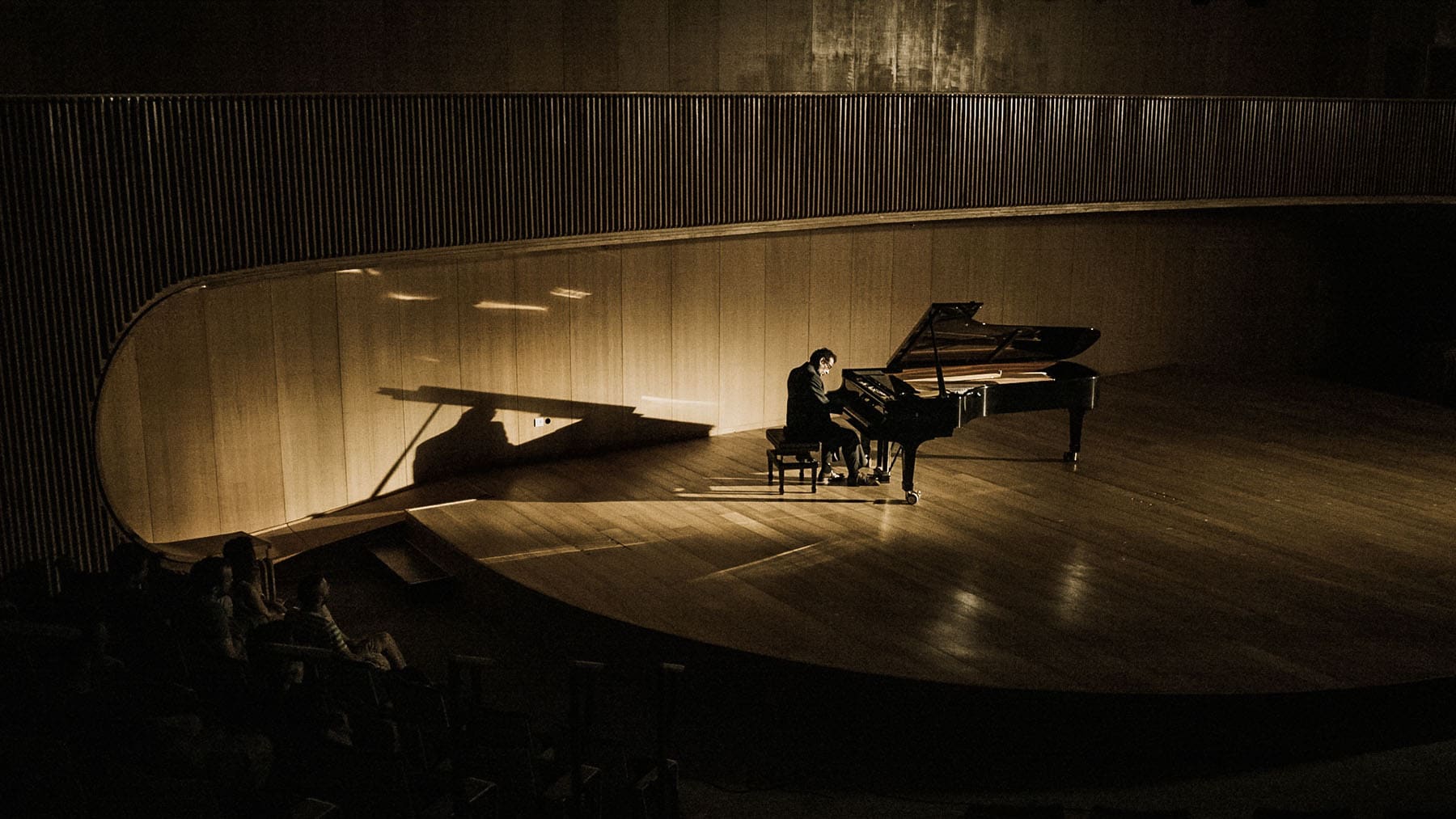 Photo courtesy Film Movement
Photo courtesy Film Movement Definition of a Greek Tragedy: “A play in which the protagonist, usually a person of importance and outstanding personal qualities, falls to disaster through the combination of a personal failing and circumstances with which he or she cannot deal.” — Collins English Dictionary.
Viewing the finely executed Israeli film “God of the Piano,” written and directed by Itay Tal, through the lens of a veteran parent disability advocate seems like a non-starter.
For one thing, there’s the establishing overhead shot of a pregnant woman’s fingers playing classical music during a concert, and then we see her amniotic fluids drip out onto her nice shoes under the piano, making it clear that mastering — no, conquering — the 88-keys is the sole religion of Anat Tal and her extended musical family. There is no place for anyone who is not a virtuoso, let alone someone who is “defective.”
Parados (entrance of the Greek chorus)
Anat’s father, Arieh Marom, is piano composer and instructor with exacting standards that are impossible for Anat to obtain. She transfers her driving ambition into her newborn baby boy. Meanwhile, her husband is distant and seems to be having an affair, absent at the time of the birth. Can her son’s dazzling pianism provide the path to her father’s love? And why are these Israelis so uncharacteristically tight-lipped? The film itself has the texture of a ballet, with muted colors framing the music and movements and very few spoken words.
Episode (Main action)
Anat’s baby boy is a healthy newborn with all ten fingers and toes, but routine testing shows a potential hearing issue. He might even be deaf. Spoiler alert: Out of desperation to raise a musical prodigy, Anat switches her baby for another in the hospital nursery.
On the drive home from the hospital, Anat’s husband asks her if she’s told anyone about the baby’s possible deafness. No, of course not. He signs them up to learn sign language at the “Silent Speaking” institute, which they never attend because at his one-month checkup, Idan’s hearing is better than normal. What a relief!
The next time we see Idan, he is around 7 or 8, and already playing Bach’s Prelude beautifully, getting ready for his first concert. Then, the action shifts to Idan’s 12th year, when he is getting ready to apply for the most prestigious music conservatory in Israel, a place where budding pianists from abroad compete to attend. Tiger Mom Anat will do anything to get Idan into the conservatory, including having an affair with the number one pianist in Israel so he will mentor Idan.
Of course, there are twists in the journey to musical greatness, as Idan starts to rebel — he wants to be a typical video-playing teen and go on a class overnight trip. Destiny, like water, seems to be slipping away from Anat no matter how hard she grasps it.
Stasimon (Greek Chorus comments on the episode)
When Anat’s baby appears to be deaf, I internally cheered — maybe this would turn out to be a heartwarming movie about the acceptance of a deaf child? How wonderful it would be to show Israel’s musical elite embracing human diversity? Perhaps the baby grows up to be a musical genius despite his deafness, like Beethoven, sensing the minutest of vibrations?
Alas, this film is a bloodless tragedy, not an inspirational feel-good film. It was gut wrenching for me to watch Anat swap her beautiful newborn baby for one who responded to sound, rejecting her own flesh and blood for what she thought would be a “normal” baby.
And Anat ultimately suffers for her deception. Throughout the 12 years depicted in the movie, Anat receives periodic fundraising phone calls from the Silent Speaking charity (kudos to them for long-term donor engagement!), which trigger her back to that first unforgivable sin at the hospital. Anat eventually visits the Silent Speaking campus and meets with the Developmental Director, who drops her from the fundraising list, but not before seeing Anat’s address and noting that they are neighbors.
Anat keeps coming back to the Silent Speaking campus, seeking out a 12-year old who looks more like her than her “own” Idan. By the end, her husband and son don’t want to speak to her, and her dreams of creating a master pianist turn to dust. The curtain falls and we are left devastated, hoping that other future families in a similar situation will be able to accept, maybe even embrace the many plot turns that happen in all of our lives.
None of us, even the most talented and exceptional, can escape or outrun random happenstance, illness and, inevitably, death. Perhaps the real tragedy here is that although Anat is ready to do everything for her chosen son, in the end she has nothing.
“God of the Piano” is directed and written by Itay Tal and stars Naama Preis, Andy Levi, Ze’ev Shimshoni, Ron Bitterman and Shimon Mimran. Run time is 1 hour 20 minutes.
Michelle K Wolf is a parent disability advocate and the Founding Executive Director of JLA Trust & Services https://jlatrust.org/.























 More news and opinions than at a Shabbat dinner, right in your inbox.
More news and opinions than at a Shabbat dinner, right in your inbox.